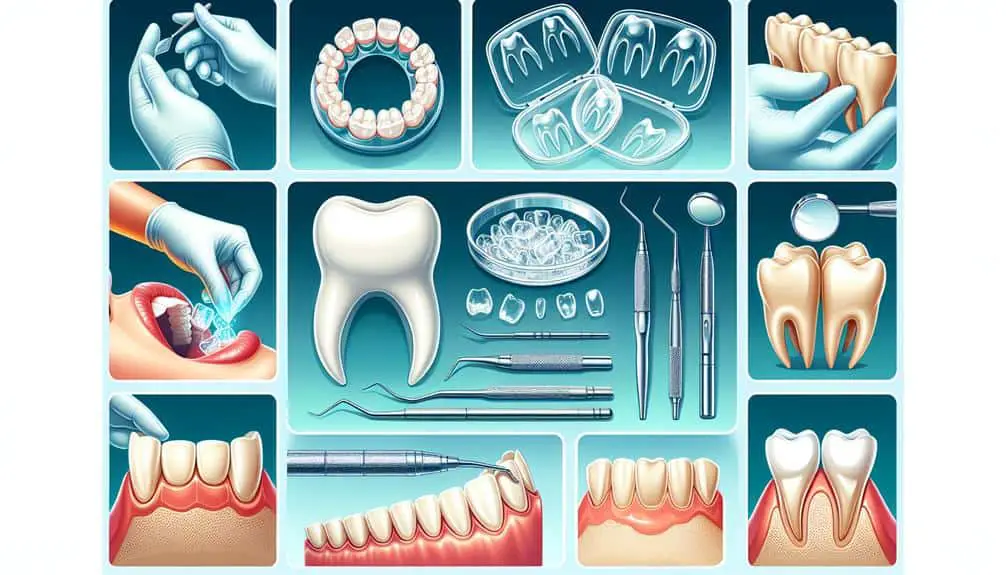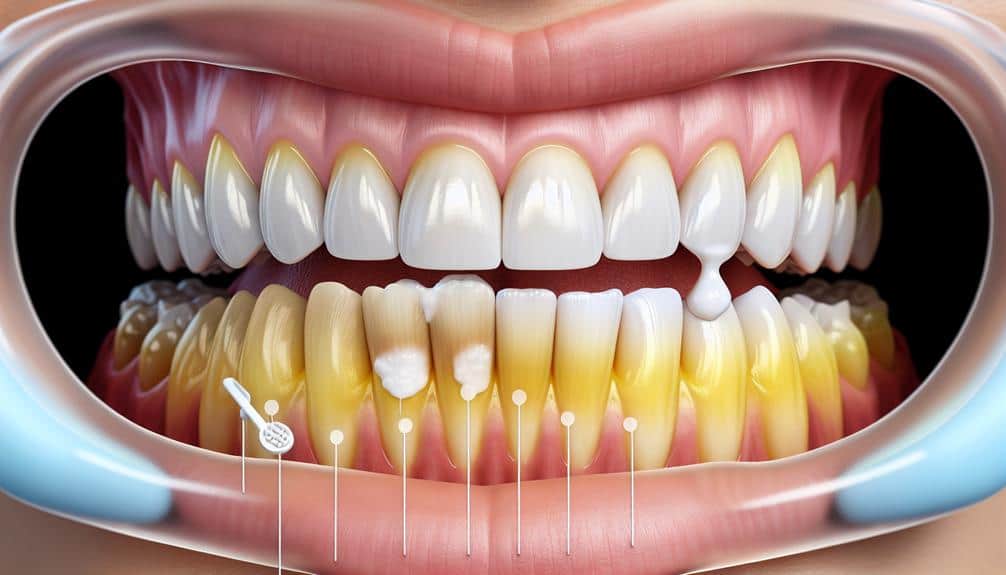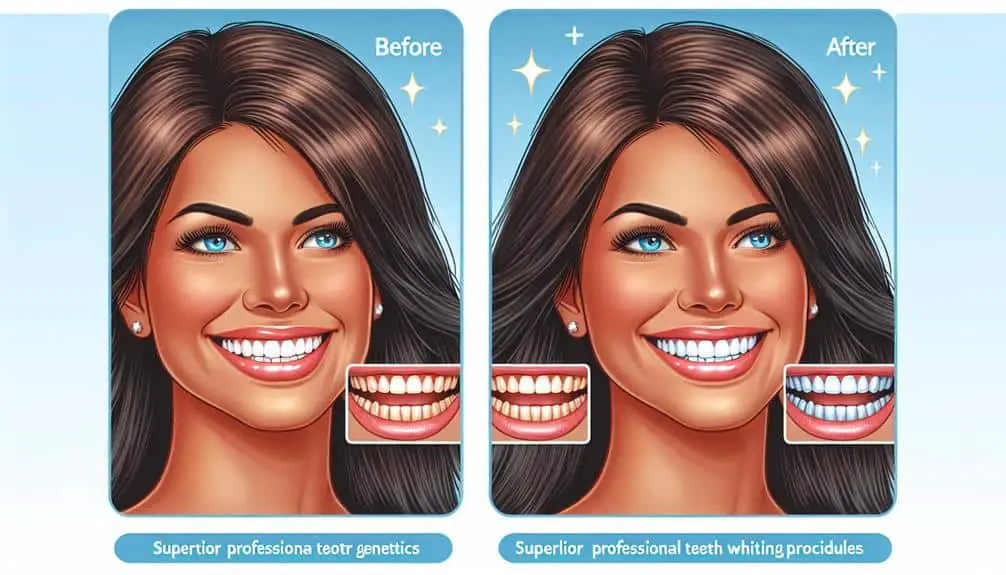Genetic tooth discoloration can be managed with options like professional bleaching, high-concentration agents, and at-home remedies such as whitening toothpaste and trays. These treatments work effectively in addressing enamel discoloration caused by genetic factors. Consider exploring these solutions for potential improvements in tooth coloration.
Key Points
- Professional bleaching effectively lightens genetic tooth discoloration.
- High-concentration bleaching agents break down stubborn stains.
- At-home remedies like whitening toothpaste and trays provide gradual improvement.
- DIY solutions offer cost-effective options for treating genetic discoloration.
- Regular dental visits help monitor and adjust long-term management strategies.
Understanding Genetic Tooth Discoloration
To understand genetic tooth discoloration, it's essential to grasp the underlying mechanisms that dictate the color variations in teeth. Genetic factors play a significant role in determining the color of our teeth. These genetic factors are inherited traits passed down from our parents, influencing the development and pigmentation of our dental enamel.
The genes responsible for tooth color are involved in the production of various proteins and enzymes that regulate the mineralization process during tooth formation. Different variations in these genes can lead to alterations in the structure and composition of enamel, resulting in varying shades of tooth color. For example, mutations in the genes encoding enamel matrix proteins can affect the thickness and translucency of enamel, leading to differences in tooth coloration.
Understanding the genetic basis of tooth discoloration is vital for developing effective treatment options that target the specific mechanisms involved. By unraveling the complexities of genetic influences on tooth color, researchers can pave the way for personalized interventions tailored to individuals with inherited predispositions to dental discoloration.
Causes of Genetic Tooth Discoloration
Genetic tooth discoloration arises from inherited genetic variations that impact the pigmentation and composition of dental enamel. This can lead to a range of discoloration issues, such as yellow, brown, or gray stains on the teeth. The causes of genetic tooth discoloration are rooted in specific factors that influence enamel development and coloration.
- Inherited Mutations: Genetic mutations passed down from parents can affect the way enamel is formed, leading to discoloration.
- Genetic Predisposition: Some individuals are more genetically predisposed to developing tooth discoloration due to variations in their genetic makeup.
- Enamel Protein Defects: Mutations in genes responsible for enamel proteins can result in abnormal enamel formation, causing discoloration.
- Metabolic Disorders: Certain inherited metabolic disorders can impact enamel mineralization, contributing to tooth discoloration.
Understanding these underlying causes is important for developing effective treatment strategies for genetic tooth discoloration.
Treatment Options for Genetic Discoloration
In addressing genetic tooth discoloration, treatment options aim to rectify the enamel pigmentation variations inherited from genetic factors. For those seeking immediate and professional solutions, in-office treatments such as professional bleaching offer efficient ways to lighten tooth color. Professional bleaching involves the use of high-concentration bleaching agents that penetrate the enamel to break down stains effectively.
On the other hand, at-home remedies like do-it-yourself (DIY) solutions can provide a more gradual approach to treating genetic tooth discoloration. DIY solutions may include whitening toothpaste, whitening strips, or whitening trays that are applied at home over a period of time to gradually improve the appearance of discolored teeth. While these methods may take longer to show noticeable results compared to professional treatments, they can be a cost-effective option for individuals looking to address genetic tooth discoloration at their convenience.
Pros and Cons of Cosmetic Whitening
Considering the effectiveness and potential drawbacks, cosmetic whitening offers a range of benefits and limitations when addressing tooth discoloration. Cosmetic whitening treatments are a popular choice due to their ability to improve the color of teeth effectively. However, there are some potential risks associated with these procedures that need to be carefully considered.
- Effectiveness: Cosmetic whitening can noticeably lighten the shade of discolored teeth, improving the overall aesthetics of your smile.
- Potential Risks: There's a risk of tooth sensitivity and gum irritation following whitening treatments.
- Cost Considerations: The cost of cosmetic whitening can vary depending on the method chosen, ranging from over-the-counter products to professional in-office treatments.
- Maintenance Requirements: To maintain the results of cosmetic whitening, regular touch-up treatments or adjustments to lifestyle habits may be necessary.
Before opting for cosmetic whitening, it's essential to weigh these pros and cons carefully to make an informed decision.
Long-term Management Strategies
When managing long-term strategies for tooth discoloration, it's essential to establish a thorough plan that includes regular monitoring and maintenance protocols. Home remedies such as baking soda and hydrogen peroxide can help maintain tooth whiteness but should be used cautiously to prevent enamel damage. Additionally, incorporating dietary changes like reducing the intake of pigmented foods and beverages such as coffee, tea, and red wine can aid in preventing further discoloration.
Regular dental visits for professional cleanings and check-ups are vital for monitoring the progression of tooth discoloration and adjusting treatment plans accordingly. Dentists may recommend treatments like professional whitening procedures or veneers to address persistent discoloration effectively.
Adhering to good oral hygiene practices, including brushing twice a day, flossing, and using fluoride toothpaste, is crucial for long-term management of tooth discoloration. By combining these strategies with professional dental care, individuals can maintain a brighter and healthier smile.
Frequently Asked Questions
Can Genetic Tooth Discoloration Be Passed Down Through Generations?
Genetic tooth discoloration can indeed be passed down through generations. Proper dental care is important in prevention. By implementing good oral hygiene practices, you can help safeguard against this genetic inheritance affecting future family members.
Are There Any Home Remedies That Can Help Improve the Appearance of Genetically Discolored Teeth?
To enhance your smile, consider natural remedies like baking soda or activated charcoal for genetic tooth discoloration. However, for long-lasting results, seek professional treatments and guidance. DIY solutions may offer temporary improvements, but professional care guarantees the best outcomes.
Is Genetic Tooth Discoloration Linked to Any Other Health Conditions or Genetic Disorders?
Genetic tooth discoloration can be linked to various health implications and genetic disorders. Understanding the genetic inheritance and family history can provide insight into potential connections with other health conditions or genetic disorders.
How Common Is Genetic Tooth Discoloration Compared to Other Causes of Tooth Discoloration?
Genetic tooth discoloration, while less common than other causes, can impact individuals. Understanding prevalence comparisons aids in treatment decisions. Genetic inheritance plays a role; prevention methods can help manage this condition effectively.
Are There Any Alternative Treatment Options for Genetic Tooth Discoloration Besides Cosmetic Whitening?
When considering alternative treatments for genetic tooth discoloration, explore natural remedies like oil pulling and baking soda. Dental bonding can also help cover up stains effectively. Consult your dentist for personalized advice.



